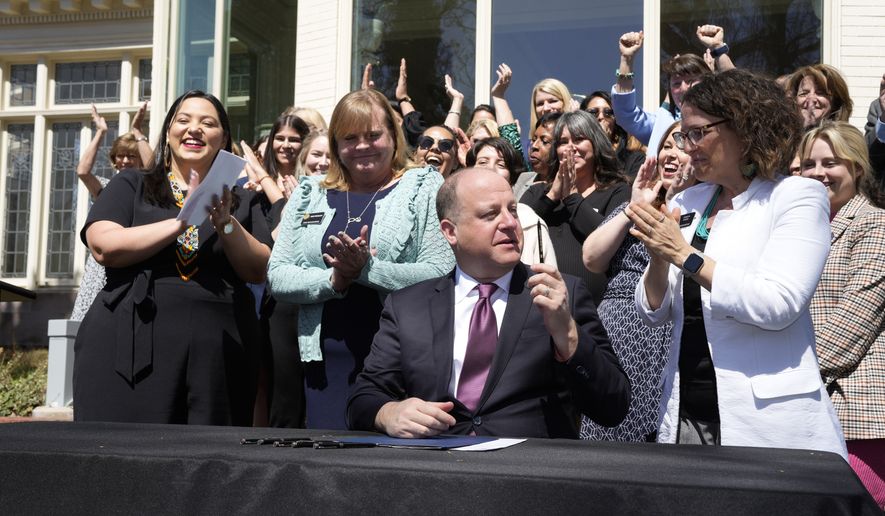Colorado joined the ranks of blue states moving to codify Roe v. Wade with a law declaring that abortion is a fundamental right for “pregnant individuals.”
Gov. Jared Polis signed the Reproductive Health Equity Act on Monday, making Colorado the latest state to enshrine unfettered abortion access into law ahead of a Supreme Court ruling expected to overturn or limit the 1973 Roe v. Wade decision.
“Roe v. Wade has been eroded in the last few years,” Mr. Polis said at the bill-signing ceremony. “Roe v. Wade has been weakened, and many legal pundits conclude it’s likely a matter of time until the federal protections at the Supreme Court simply cease to exist. We in Colorado simply don’t want to take that risk.”
The Democratic governor did mention “women” several times at the start of his speech before switching to “person.”
“This bill codifies a person’s right to make reproductive health care decisions free from government interference,” Mr. Polis said. “In the state of Colorado, the very serious decision to start a pregnancy, or to end a pregnancy, with medical assistance, remains between a person, their doctor, and their faith.”
The five-page law scrupulously avoids using “women,” opting instead for “individuals” or “Coloradans,” except when citing Dobbs v. Jackson Women’s Health Organization, the case now before the high court.
Gender-neutral references to women are increasingly the rage on the left, driven by LGBTQ advocates who argue that the use of gender-specific language in reference to pregnancies is exclusionary for biological women who identify as men.
The Biden administration drew attention in June when it replaced “mothers” with “birthing people” in its 2022 budget proposal.
In addition to guaranteeing unlimited abortion access, the Colorado measure makes it clear that a “fertilized egg, embryo or fetus does not have independent or derivative rights under the laws of this state.”
While symbolically significant, the law changes little on the ground in Colorado, which was already a no-limits abortion state. The Boulder Abortion Clinic, for example, is known for providing third-trimester procedures.
Colorado does require “parental notification,” not consent, for minors seeking abortions. Mr. Polis said in a signing statement that the law on parental notification remains unchanged.
Jeff Hunt, director of the Centennial Institute at Colorado Christian University, said the law’s passage represented “one of the most shameful moments in Colorado history.”
SEE ALSO: Pro-life activists: Fetuses handed over so police could probe timing of the abortions
“It [the law] allows abortion at any point in the pregnancy, even up until moments before birth,” Mr. Hunt said. “It goes further to prevent localities from being able to keep abortion facilities out of their neighborhoods. If you wanted to craft a law that would be a total giveaway to the abortion industry, allowing no restrictions whatsoever, Colorado’s radical abortion law would be that law.”
Three states and the District of Columbia have “codified the right to abortion throughout pregnancy without state interference,” while 12 states “explicitly permit abortion prior to viability,” according to the Guttmacher Institute.
Colorado followed on the heels of New Jersey, where Democratic Gov. Phil Murphy signed a bill in January that “codifies the constitutional right to freedom of reproductive choice.”
In November, Vermont voters will decide on a constitutional amendment to guarantee the right to abortion after the state legislature voted in February to move the measure to the ballot.
The Colorado law did have an immediate impact on the Park County Board of County Commissioners, which was scheduled to vote Tuesday on a proclamation designating the jurisdiction a pro-life “sanctuary county.”
Instead, the commissioners voted 2-1 to remove the item from the agenda, citing concerns about the just-signed state law’s provision warning that public entities may not “deny, restrict, interfere with, or discriminate against an individual’s fundamental right to use or refuse contraception or to continue a pregnancy.”
Commissioner Dick Elsner said at Tuesday’s meeting that the proclamation “could put us sideways with the state,” saying it was “pretty clear that the legislative intent was, we are not to do these things.”
He cited a recent comment by House Majority Leader Daneya Esgar, one of the bill’s sponsors.
“That’s the main reason we knew we had to move quickly on this bill this year because if Roe falls in June, we want to make sure counties can’t say that you cannot access abortion in their county legally,” she told 9News.
Disagreeing was Commissioner Amy Mitchell, who said the proclamation was a statement, “not an enforcement mechanism.” She also argued that the counties have a duty to protect “health, safety and welfare.”
“I just want to say that it’s a sad day when the state of Colorado has allowed a beautiful baby to be murdered one minute before it is born,” Ms. Mitchell said. “It breaks my heart, and it is so wrong because there are families out there that would take a baby and give it a loving home.”
• Valerie Richardson can be reached at vrichardson@washingtontimes.com.




Please read our comment policy before commenting.